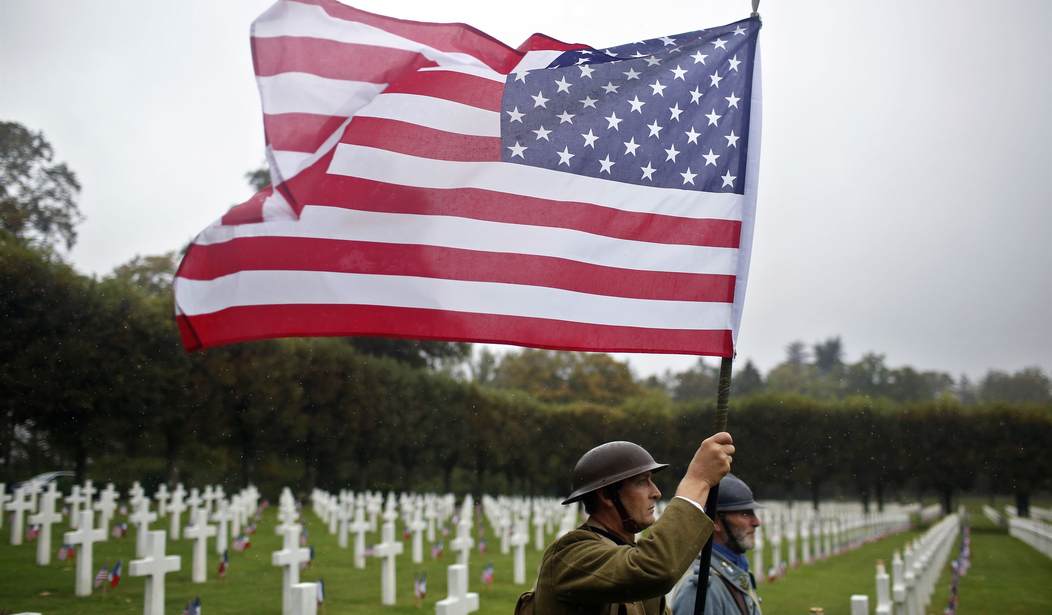The broad stripes and bright stars of “Old Glory,” the U.S. flag, are a symbol of all that is best and greatest about America. The patriots of our past fought and died for that flag, and today on Flag Day we too honor the Star Spangled Banner.
The Continental Congress adopted the “Stars and Stripes” as our official American flag on June 14, 1777, an event we now celebrate on this holiday of Flag Day. It is fitting that today is also the birthday of the U.S. Army, the Army that won our independence in the Revolution under the Stars and Stripes and has been championing liberty at home and abroad ever since (in spite of some very incompetent or corrupt leaders).
George Washington, Alexander Hamilton, James Armistead Lafayette, James Monroe, Abraham Lincoln, U.S. Grant, Douglas MacArthur, and George Patton are just a few of the illustrious names the Army can claim in its annals of service. From Yorktown to Gettysburg, from Vicksburg to Belleau Wood, from Mexico City to Normandy, from Rome to Saigon, from the Chosin Reservoir to Kabul, the brave soldiers of the U.S. Army have fought valiantly with Old Glory flying above them. Today I want to share the story of the song that is now our national anthem, the “Star Spangled Banner,” honoring our flag.
It was during the War of 1812 that the story of the “Star Spangled Banner” began. The Smithsonian Magazine tells the tale. British warships were bombarding Fort McHenry in Baltimore Harbor on Sept. 13, 1814, a bombardment that lasted for a brutal 25 hours. The British had recently burned the U.S. capital of Washington, D.C., and now, after this demoralizing event for the Americans, the Battle of Baltimore was unfolding.
Francis Scott Key was an American lawyer, 35 years old, at the time of the battle. Only the week before, he had boarded the British flagship to try and obtain the release of a friend. While the British were apparently persuaded, they did not want to release the Americans until after the planned attack on Baltimore. Key was therefore on his own ship but being guarded by the British when the Battle of Baltimore occurred, and though some eight miles away Key was still able to see the battle unfolding with his own eyes. “It seemed as though mother earth had opened and was vomiting shot and shell in a sheet of fire and brimstone,” he recalled.
Given the scale of the attack, he was certain the British would win. The hours passed slowly, but in the clearing smoke of "the dawn's early light" on September 14, he saw the American flag—not the British Union Jack—flying over the fort, announcing an American victory.
The event so moved Key that, while still on the ship, he poured out his thoughts in a poem he set to the tune of a popular English song. Little did he know how historic that poem would be. The Smithsonian explains:
His brother-in-law, commander of a militia at Fort McHenry, read Key's work and had it distributed under the name "Defence of Fort M'Henry." The Baltimore Patriot newspaper soon printed it, and within weeks, Key's poem, now called "The Star-Spangled Banner," appeared in print across the country, immortalizing his words—and forever naming the flag it celebrated.
The Smithsonian still has the tattered flag that flew over Fort McHenry, and it is on display at the National Museum of American History. On March 3, 1931, Herbert Hoover signed a congressional act making the “Star Spangled Banner” our national anthem.
There are actually more stanzas of Key’s poem than we usually sing, but below is the stanza all patriots know:
Today, take the time to thank a U.S. soldier and sing the “Star Spangled Banner” while saluting our flag. For while the Stars and Stripes is beloved by patriots, our great nation never will be completely destroyed.O say, can you see, by the dawn's early light,
What so proudly we hailed at the twilight's last gleaming?
Whose broad stripes and bright stars through the perilous fight,
O'er the ramparts we watched were so gallantly streaming;
And the rocket's red glare, the bombs bursting in air,
Gave proof through the night that our flag was still there;
O say, does that star-spangled banner yet wave
O'er the land of the free, and the home of the brave?










Join the conversation as a VIP Member